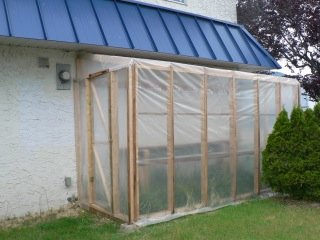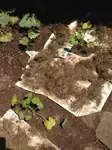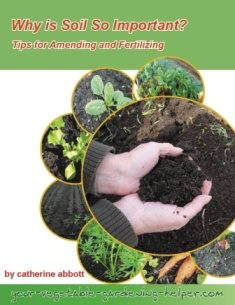Winter Vegetable Gardening
Depending on where you live and your climate, winter vegetable gardening can involve harvesting, sowing, cultivating and evaluating. If you live in a warm climate you can be planting and growing certain vegetables all year long. For most gardeners winter is the time to put your garden to bed and to start planning for your next growing season.


If your garden is basically finished like mine is as you can see in this picture, now is the time to look back on your gardening season. If you wait too long memories fade. Review your garden journal; by evaluating how your vegetables grew, what worked or did not work will give your a head start in having an even better garden next year.
Here are some questions you can ask yourself.
- Did you have a good garden site? Did you get enough sunlight?
- Was the garden large enough or was it too large?
- Were the vegetables you planted worth the space they used up?
- Were there any vegetables that you did not like to grow or eat?
- Were there any varieties that did better than others?
- Could you have planted more of certain vegetables?
- Did you plant too much of any vegetables?
- Did you plant the vegetables varieties at the right times? Too early? Too late?
- Did you have problems with insects or pests? Which vegetables were affected?
- Did you have any disease problems? With what vegetables?
- Did you have all the tools that you needed? Are they still in good shape?
- If you tried some new techniques such asmulching , how did it work out?
- Did you have as much fun as you thought you would gardening?
I divide my winter vegetable gardening to do list over 3 separate months.
Winter vegetable gardening in December
- Harvest Brussel sprouts, cabbage, salad greens, and kale. Finish lifting all your root vegetables to store.
- If you live in warmer climates you can sow lettuces, salad greens and even peas.
- Complete cleaning up your garden, compost leaves and other vegetable material. Store stakes and other gardening equipment and supplies.
- You need to protect plants like artichokes, or potatoes, carrots that you are leaving under ground for the winter, especially if you live in a cold climate. Mulch with straw or leaves.
- Gifts for Christmas:
Here are a few items that you could give or add to your gift list:
- tools - shovels, hoe, trowels, garden rototiller
- gift of vegetable seeds - if you haven't this year, remind yourself to save some for next year
- seed starter kits which include flats, container heating cables, lights
- gardening books
- soil testing kit
- cold frames or greenhouses (if you want to give a really large gift!)
Vegetable gardening in January:
- Check the root vegetables that you have stored every few weeks and remove any that have signs of rotting.
- Continue to harvest kale, cabbages or any other vegetable you may still have in your garden beds or cold frames.
- Onions can be started indoors in flats; that way you will have nice large ones next fall.
Vegetable gardening in February:
- Make sure you are using the vegetables you have stored, canned or frozen.
- Salad greens, lettuce, tomatoes, and basil can be started indoors.
- Have your soil tested. If your soil is dry enough this is a good time to apply lime to your soil beds.
- Study seed catalog's, order seeds and any other supplies you may need after your evaluation of what did or did not work last season.
- If you need some assistance to start your vegetable garden layout plan check out my easy to follow, step by step garden design books.
Winter vegetable gardening is usually less hectic so make sure you take time to rest, rejuvenate and plan so can enjoy your spring to do list.
Recent Articles
-
Organic Gardening soil amendments - List of material?
Aug 09, 25 10:57 AM
What materials are best used as organic gardening soil amendments? -
Tips for disease control in your vegetable garden
Jul 14, 25 11:15 AM
Easy tips for disease control to keep your vegetable growing its best. -
Joy of vegetable Gardening
Jul 14, 25 11:01 AM
Everything you need to know is right here to have Joy of Vegetable Gardening





